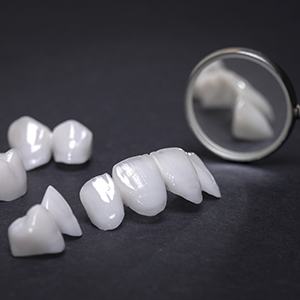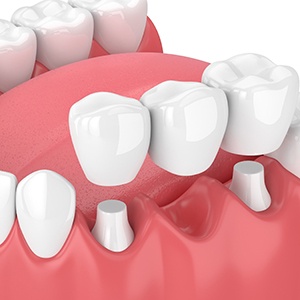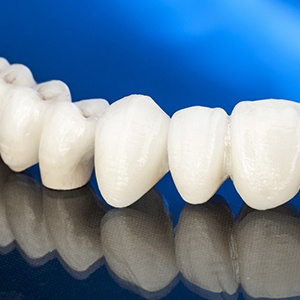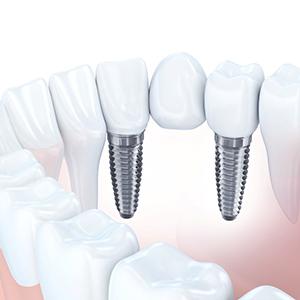Dental Bridges – Haverhill, MA
Rebuild Your Smile with a Dental Bridge

Teeth are meant to last for your lifetime, but that doesn't happen for many adults. 120 million Americans are missing at least one tooth. If you've lost a tooth or 2 over the years, Dr. Parsia Koleini has the solution you need to rebuild a complete, beautiful smile with a dental bridge in Haverhill. You will enjoy natural-looking results, so no one will know your bridge isn't real teeth.
Why Choose Associates in Dental Health for Dental Bridges?
- Natural-Looking Materials
- Advanced Technology
- Personalized Treatments
What is a Dental Bridge?

A fixed bridge has been the traditional method of replacing 1 to 3 consecutive missing teeth for generations. Prosthetic teeth are created from an impression of your mouth to fill the space of those you've lost. The restoration is held in place using crowns or dental implants. Your new teeth will closely look and feel natural to look and feel your best.
Types of Dental Bridges

You have more options than before to treat lost teeth. After examining your mouth and learning more about your goals, your dentist will recommend either:
Traditional Dental Bridge
All-ceramic material is used to create your bridge, which will replicate the portions of your teeth above the gum line. Your adjacent teeth are reshaped to allow dental crowns to fit over them to hold your bridge in place. On average, a fixed bridge can last for 10 to 15 years before needing to be replaced.
Implant Bridge
As an alternative to traditional methods, over 500,000 Americans are choosing dental implants to treat missing teeth. An implant is unlike any other treatment because it replaces both the root and the crown. 1 to 2 dental implants are surgically placed into your jaw to support your bridge. You'll benefit from unmatched support and stability using a solution with over a 95% success rate. Dental implants are proven to last for 30 years or more with the correct aftercare, like brushing and flossing.
The Benefits of Getting a Dental Bridge

Tooth loss is more than an aesthetic issue. Not only can missing teeth affect your self-esteem, but they also influence your oral and general health. Replacing them provides exceptional benefits for your overall wellness and quality of life.
You will boost your self-esteem and restore a professional image while stopping common complications caused by tooth loss, like decay, gum disease, and additional missing teeth. As a result, you'll reduce your long-term dental expenses by avoiding costly procedures in the future.
Our office uses high-quality materials for durability and strength to enjoy a long-term investment. We also custom-craft each dental bridge to meet the exact color, size, and shape of your natural teeth to blend in with your smile.
Don't let a gap in your smile affect your quality of life any longer. Will create the personalized plan you need to turn back the clock. Request an appointmentthrough our website or call (978) 775-3264.
Dental Bridges FAQs
Is Getting a Dental Bridge Painful?
Thankfully enough, no – getting a dental bridge isn’t painful. The entire process is smooth and easy when performed by qualified dentists.
You see, a dentist will numb your mouth before placing a dental bridge. All they have to do is apply topical anesthetic to the abutment teeth that secure your device. Once they have, you won’t feel any pain or aches from the bridge placement. The most you’ll sense is some slight pressure as the dental team works.
The teeth securing your dental bridge will only feel sore after your procedure. By that point, you can manage any lingering aches with over-the-counter pain medication. Good examples include ibuprofen and acetaminophen.
Can Dental Bridges Get Cavities?
A dental bridge will never get cavities; it’s artificial and lacks enamel. However, the natural teeth securing this device can.
Food debris can become trapped near your dental bridge, whether underneath your pontics or the space where the crowns meet your gums. As such, there’s a chance for harmful bacteria to gather around your abutment teeth and cause cavities or gum infections. That outcome is especially likely if you have poor oral hygiene and don’t clean your bridge daily.
At the same time, a bridge’s cement can crack once your device nears the end of its life. Bacteria could then enter the resulting gaps and cause infection or decay.
Do Dental Bridges Feel Natural?
Within a few days of getting it, your dental bridge should feel quite natural to you. It won't cause any unpleasant or "odd" sensations.
Remember, today’s dental bridges are made from durable materials. That means they can withstand everyday chewing forces as well as enamel can. Eating with your final prosthetic shouldn’t feel strange, as it’ll endure your bite without breaking.
Treatment also ensures that your dental bridge fits well. A dentist reshapes your abutment teeth so the device sits comfortably, and the prosthetic is based on impressions of your smile. As a result, the final bridge shouldn’t feel awkward or even noticeable once placed.
Can Dental Bridges Be Whitened?
Sadly, no – a dental bridge can’t be whitened like natural teeth can. Cosmetic dentistry doesn’t have the power to brighten this device’s color.
It comes down to how professional teeth whitening works. As the treatment’s bleaching gel enters enamel through tiny pores in your teeth, it breaks apart surface stains and brightens your grin. However, dental restorations like bridges don’t have such pores; they’ll thus remain the same color.
Of course, you can always find workarounds for this restriction. One idea is to get teeth whitening before your bridge is even placed. That way, your chosen prosthetic will match your now-brightened smile.
